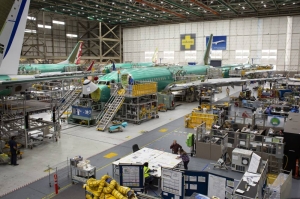Boeing delays force top Africa carrier Ethiopian to lease planes


Boeing Co 737 Max airplanes are seen at the company’s manufacturing facility in Renton, Washington. Boeing Co’s delays in fulfilling orders has forced Africa’s biggest carrier, Ethiopian Airlines, to lease aircraft to stay on track with its expansion.
The Addis Ababa-based company has waited since April to receive 737 Max jetliners and 777 freight carriers, Chief Executive Officer Mesfin Tasew Bekele said in an interview on Bloomberg Television. Boeing hasn’t provided a revised schedule for the deliveries, he said.
“We are waiting to hear from them and definitely, late delivery of airplanes will affect our growth plan,” Tasew said. “In parallel with that, we didn’t wait for Boeing to deliver the ordered airplanes, and now we are leasing airplanes,” he said.
Boeing didn’t immediately respond to a request for comment.
Commercial aircraft deliveries by Boeing, which is working through one of the most difficult periods in its history, showed signs of stabilising in July, with deliveries in the month mirroring those in the same month a year earlier.
Arlington, Virginia-based Boeing and rival Airbus SE are delaying airplane deliveries as they struggle with persistent parts shortages and workforce turnover that have lingered since the Covid-19 pandemic. The US planemaker faces added uncertainty with a possible strike looming that could shut down its Seattle-area factories next month.
Several airlines have warned that Boeing’s late-arriving jets are taking a toll on operations and finances.
Ryanair Holdings Plc reiterated frustration with the manufacturer’s delays on Tuesday as Europe’s biggest low-cost carrier may miss its annual passenger target depending on the extent of Boeing’s 737 Max jet delays.
Flydubai and Norwegian Air Shuttle ASA also said their growth will be affected by Boeing’s delivery delays as the US manufacturer has struggled to ramp up production and works to bolster quality controls following an accident in January.
The African carrier has remained a customer of Boeing despite their troubled history following the crash of an Ethiopian Airlines 737 Max in March 2019 that killed all on board. Last year, the state-owned company announced it was ordering 11 of Boeing’s 787 Dreamliners and 20 of its 737 Max airplanes as part of a fleet overhaul.
Ethiopian Airlines is scheduled to receive 16 aircraft in its current fiscal year that ends in June, Tasew said. It’s due to get four A350-1000 from Airbus, with the first due in October and the last in March, he said.
“The next promised delivery dates that we received from Boeing for the 777 freighter is for the quarter of September,” Tasew said. “Boeing didn’t tell us a schedule or a revised schedule for delivery of the next 737 Max airplanes.”
Boeing will open an office in Addis Ababa in October, and plans to strengthen cooperation for joint production of aircraft components.
Ethiopian Airlines is exploring plans to expand on the continent, where it has already partnered with operators in Togo, Malawi and Zambia.
“A few African governments have requested us to go there to form airlines in partnership,” Tasew said. Others “have requested us to manage their own airlines without equity partnership, which we are considering as well,” he said, adding that his company will have “some sort of partnership with at least two African nations in the coming 12 months.”
This could involve investing in existing operators or starting brand-new airlines together with an African government, he said.
Meanwhile, plans to establish a carrier together with institutional investors and the Nigerian government have ended, Tasew said.
“It was not welcomed,” he said. “Our intention was to help the country, but since they objected to the idea, there is no need for Ethiopian Airlines to go there.”
The proposed carrier would have given Ethiopian Airlines a foothold in Africa’s most populous country, where about 23 domestic airlines compete for influence. Previous government attempts to start a flag carrier have failed.







